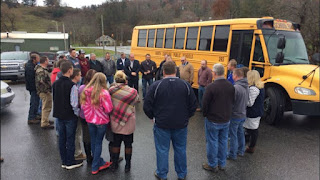The news this weekend was interesting. The President of the United States finked out of a once-in-a-hundred-year commemoration of the end of the War To End All Wars (which, of course, didn’t). The official excuse for his not showing up at the Aisne-Marne American Cemetery in Belleau, France was that his 50-mile trip was “canceled due to scheduling and logistical difficulties caused by the weather.”(1) The weather (rain) supposedly made the ceiling too low for a flight by helicopter. Sarah Hockey Puck Sanders, White House Press Secretary, produced a photograph of the climatic conditions for the assembled press corps (minus CNN's Jim Acosta, naturally):
When questioned by incredulous newsmen, she denied the photo was “doctored.”
The ceremony was attended by Chief of Staff John Kelly, who traveled by automobile. The White House later issued a statement that the President himself couldn’t go by car because of a fear of causing a traffic jam.(2)
Cynics immediately responded by claiming that while rain was indeed the issue, it wasn’t about helicopter altitude, but about hair altitude—that Trump was afraid that this:
would end up looking like this:(3)
Safe from the rain, Trump apparently stayed high and dry in his hotel room, where he could focus on the greatest mobilized threat a president has faced since the Battle of the Bulge—THE CARAVAN:
That is, the refugees from violence, hunger, and economic despair filtering through Central America toward the southern border of the US. But who were, according to Trump, infiltrated by shady Middle Easterners:
In his hotel room Trump presumably was fashioning orders for the mobilization of crack army troops to secure the border:
The greatest beneficiary of Trump’s troop movements would be his firmest political base—the white evangelical Christian bloc—here seen praying against Shakespeare(4):
What these evangelical Christians would gain from the barring of the Latin American asylum seekers would be never having to mix in their congregations with a bunch of Latinos named Jesus.
***
(1) https://www.cnbc.com/2018/11/10/trump-cancels-ww1-memorial-at-us-cemetery-in-france-due-to-rain-sparking-twitterstorm.html
(3) Ben Jennings, https://www.theguardian.com/commentisfree/picture/2018/nov/11/ben-jennings-on-donald-trump-marking-the-armistice-cartoon








